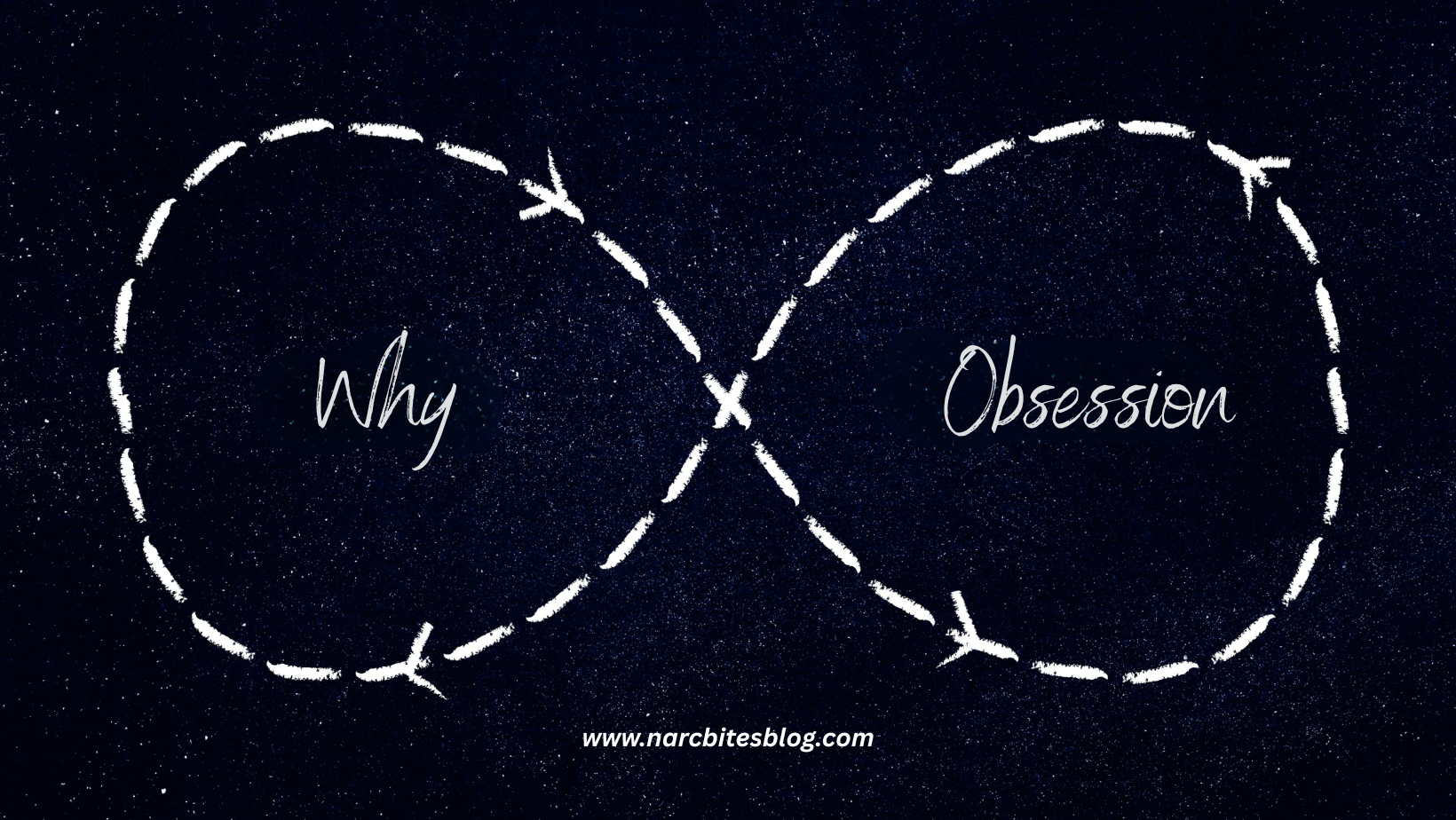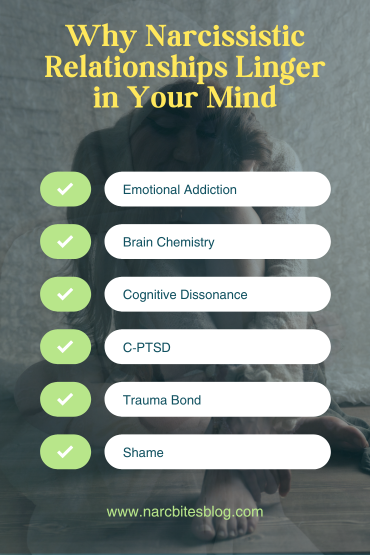Do you know that feeling when, after ending a narcissistic relationship, you can’t stop replaying everything in your head? You wake up and replay the same conversations. You keep hearing the same words over and over. That look they gave you when you asked a simple question. The way they went silent after you tried to talk about how you felt. The way they suddenly acted warm, as if nothing had happened, just when you started to pull away. You keep thinking about what they said, what they promised, and how much they “loved” you. And in the next moment, the question comes: if you were the love of their life, why did they discard you, humiliate you, and cheat on you?
It does not matter whether they put you on the shelf with the rest of their supply or you were the one who managed to end the relationship, the questions and doubts won’t let you rest. Maybe not even years later.
Rumination After Narcissistic Abuse: A Psychological Loop
Ending a relationship with a narcissist often does not bring the peace you hoped for. You are no longer together, you blocked their number, they have no power over you anymore, but your mind cannot let go of the past.
When you open your eyes in the morning, your first thought is about them. And you feel the pain of missing them. You imagine what it was like waking up next to them, and it feels unbearable to know they are now doing that with someone else. Even though you know you are the lucky one, you still feel this way.
You keep asking yourself the same question over and over again: “Why am I still thinking about them? Why can’t I let go?” The worst part is that people around you keep asking the same question. That is when you get the helpful advice, “Just get over it already!” And you cannot explain what you are really going through, so you just stay quiet.
The good news is this is not happening because you have lost your mind, and it is not because you are still in love with the narcissist, even if it feels that way sometimes.
You are simply traumatized. Your brain cannot release trauma until it understands it. And narcissistic games are not easy to understand. That is the whole point.
Why Rumination After a Narcissistic Relationship Happens
It feels like your mind is digging through the past, looking for one missing piece that will make it all make sense.
But narcissistic relationships do not make sense. That is the trap your brain fell into. Your mind is wired to seek resolution. When you live through trauma, especially betrayal, gaslighting, or emotional manipulation, your nervous system keeps the danger alive until it feels processed. With narcissistic relationship trauma, there is no clean ending. No apology. No closure. Just confusion. And confusion keeps you stuck in the loop.
Emotional Addiction to the Narcissist
You remember the beginning so clearly. The way they made you feel like the most important person in the world. The rush you felt when they texted you good morning. The way they looked at you like you were everything they had ever wanted.
Then it changed. Suddenly they pulled away. Their face went cold. They criticized you for small things or ignored you for days. You tried harder, hoping for a smile, a kind word, the same affection you felt at first. When it came, even in small doses, it felt like relief after holding your breath too long.
This is how a trauma bond works. Your brain becomes addicted to the cycle. The highs feel magical. The lows feel unbearable. You are not missing the person. You are missing the chemical rush, the hope that came after every painful withdrawal.
.
Brain Chemistry After a Narcissistic Relationship
Narcissistic abuse changes the chemical processes in your brain. You may notice your memory getting worse. You struggle to concentrate. Stress can trigger brain fog, which feels like a constant state of mental cloudiness. You cannot focus on more than one thing at a time. You find it hard to follow conversations. You are distracted and catch yourself doing things you never would have imagined before. You cannot sleep, your energy levels are low, you feel constantly tired, or you experience mental exhaustion. Because of this brain fog, even everyday tasks take more effort than usual.
The stress you experience in a narcissistic relationship activates your body’s natural fight-or-flight response, raising your blood pressure, blood sugar levels, and heart rate. Chronic stress exhausts the body over time, causing both mental and physical symptoms.
The constant emotional whiplash floods you with cortisol and adrenaline. Your limbic system, which processes emotions and memories, stays on high alert. Your prefrontal cortex, which helps you think logically, becomes quiet.
In healthy love, your brain links affection with safety. In a narcissistic relationship, love becomes linked with tension, guessing moods, and constant alertness. Your brain stores these mixed signals like a program that never shuts down.
Even after it ends, your system keeps scanning for danger, for meaning, for the missing piece.
Cognitive Dissonance and the Narcissist
You know they lied. You know they hurt you. But you also remember the way they touched your hair when you were sad. The way they whispered that you were their everything.
Two truths are at war inside you. You know they abused you, yet you miss them. You know they betrayed you, yet you long for the attention they gave you.
This is cognitive dissonance. They punished you, then comforted you. They insulted you, then told you how lucky they were to have you. Your brain keeps replaying the story because it cannot reconcile who they really were. Not because you enjoy suffering, but because you are trying to solve a paradox that cannot be solved.
C-PTSD After a Narcissistic Relationship
Complex post-traumatic stress disorder is a condition that develops after long-term exposure to ongoing emotional trauma, where escape feels nearly impossible.
The most characteristic symptoms of C-PTSD are flashbacks. Seemingly out of nowhere, sudden fragments of memories resurface. Any trigger that reminds you of the past can set them off. It can be a sound, a smell, or a song.
These intrusive memories are uncontrollable, forcing you to relive the events over and over. They often appear in the form of nightmares. Other symptoms of C-PTSD include anxiety, reduced cognitive abilities, mood swings, or avoidance as a coping mechanism.
So the fact that your thoughts constantly revolve around the narcissist is not obsession. It is a trauma response.
Why You Miss Your Narcissistic Ex
Because, in the beginning of the relationship, you felt like the best version of yourself with them. You miss the version of you that felt powerful, adored and magnetic. And you miss how they made you feel seen in a way no one else ever had. You felt like finally someone was there whose heart beat in rhythm with yours, who shared your goals and dreams.
That is why you cannot let go of the idealized future the narcissist painted for you during the love bombing phase. You are still waiting for them to come back so you can live out that shared dream, even if for them it was never real. Maybe they were not even fully aware of this at the time, but that does not excuse their behavior – it only explains it.
Missing them does not mean they were good. It means the illusion worked.
The Grip of the Trauma Bond
You remember the relief you felt when they smiled at you after days of silent treatment. And you remember how your heart raced when they sent a simple heart emoji after ignoring your messages for hours.
This is how trauma bonding develops, through these conflicting behaviors. You learn to associate their attention with safety, as strange as it sounds. When that attention disappears, the feeling of safety disappears too, and you panic. That is why leaving a narcissistic relationship is not like ending a normal one.
You do not just get up and walk away from a narcissistic relationship. It causes withdrawal symptoms. Your body goes through detox.
The Role of Shame in Obsession
When you keep replaying events in your head, you are trying to figure out where you went wrong. You repeat sentences like, “If I had understood sooner, I wouldn’t feel like this now,” or “Why didn’t I see this earlier? Then I wouldn’t have lost everything.”
You beat yourself up. The shame you feel traps you. But this shame is not yours. The narcissist fed it to you slowly, especially during the devaluation phase, making you feel guilty simply for existing.
It is completely understandable that you are trying to put the pieces together. You want a clear beginning, middle, and end to a story that was built to be confusing.
Withdrawal After a Narcissistic Relationship
When a narcissistic relationship ends, you are almost certainly deeply wounded. And yet everything still reminds you of them. It feels like a phantom connection. You live without them, but somehow still with them.
It is very hard to move on and start over. Maybe they’ve been living with someone else for a long time, maybe even had their next supply lined up before the relationship ended, which simply means they cheated on you. Meanwhile, you still feel as if it were cheating when you so much as notice how attractive the lead actor in a TV show is.
Because of your wounds, you have lost trust in the entire world. And the narcissist rewired your brain. Your whole life revolved around them. Your thoughts were centered on them, your routines adjusted to their rhythms, your emotions mirrored theirs.
When they left your life, they did not just leave. They took the version of you that existed in their world. It takes time to find yourself again, to become who you were before the relationship. But first, you need to let go of the hope that the person they pretended to be will ever come back.
So when the thoughts return at three in the morning, remind yourself that your mind is doing exactly what is necessary to heal. It is processing the past thought by thought.
I created a tool to help you focus not on them and the past, but on yourself and your future.
Take a look at it.




